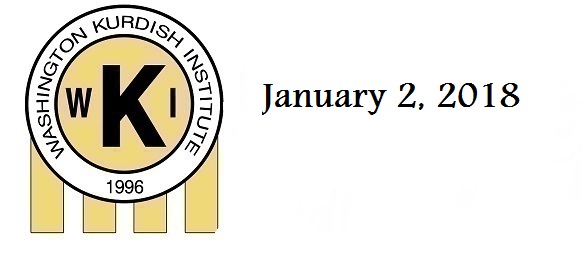930
Iran
- After the Iranian regime plans revealed to declare austerity plans that significantly cut government services, massive protests broke in several provinces against the regime, with protesters initially reacting against rampant unemployment and corruption in the country. The protests started in Mashhad city but eventually spread throughout the country and evolved into criticisms of the Iranian theocracy itself. As the protests moved into their fifth day, people took to the streets in provinces like like Kermanshah, Hamdan, Kurdistan and Tehran. The protests now not only focus on demands for economic reforms but also criticisms against the current Islamist state of Iran as well as its interventionist foreign policy in areas like Syria, Iraq, and Yemen. The regime response has been to violently crack down on the activists and organizers, especially in the Kurdish cities. The Iranian regime sent out text messages warning people not to participate in any protest or else they would face legal punishments. So far 21 protesters have been killed. The Iranian regime also shut down internet services for the majority of the country in order to prevent activists from posting video and information about the protests on social media. In several cities, protesters chanted slogans against the regime and the Supreme Court Leader Ali Khamenei. On January 1, a large crackdown by pro-Khamenei paramilitary volunteer militia attacked Kurdish protesters in Kermanshah and arrested tens of Kurdish youth.
Iraq
- During a press conference, Iraqi prime minister Haider al Abadi announced a review of employees’ names and records for the ministries of education and health in the Kurdistan region as a precondition for sending these employees their monthly salaries. Following Abadi’s announcement, the Kurdistan Minister of Health said his office will be sending the payroll records of his ministry to Baghdad. After the Independence Referendum, Abadi refuses to hold talks with Kurdistan regional Government (KRG) over disputed issues, including the lack of payments to workers in the Kurdistan region.
- After approving the reform plan, the KRG sent the proposal to Parliament for a vote. The reform package includes reviewing all payroll in the region to prevent duplicate payments and better organizing the pension system in the region. Due to the economic crises and corruption the Kurdistan region faced, a wave of demonstrations last month resulted in the death of 6 people.
Syria
- The Syrian Democratic Forces (SDF) liberated al Marsam village during the military campaign of “Al Jazeera Tempest” south of Deir Ez Zour. After intense clashes, 30 ISIS militants were killed according to the SDF. The “Al Jazeera Tempest” campaign started three months ago to liberate ISIS-controlled Deir Ez Zour province.
- The People’s Defense Units (YPG) announced the death of the main terrorist responsible for bombing the Kurdish city of Qamishli in July 2016. The YGP statement said that “Hisen Ayid El Bilebil Ebu al Welid is known as the planner of Qamishlo attack,” and that “Welid was killed in a special operation after being followed closely for months by YPG Anti-Terror Units.” According to the YPG, Ebu El Welid was a ISIS commander who moved to Deir ez-Zor.
Turkey
- On the 6th anniversary of the Roboskî Massacre, the Pro-Kurdish Peoples’ Democratic Party (HDP) submitted a proposal to the Turkish parliament to investigate the bombing of civilians by the Turkish military. The HDP lawmaker in Shirnak, Aycan Irmez submitted the proposal, which laid out details of how Turkey’s National Intelligence Organization (MIT) hid information about the operation. The Roboskî Massacre killed 34 Kurdish civilians, including 19 children, on December 28, 2011.
- A Turkish court sentenced jailed HDP Deputy Co-chair Aysel Tugluk to one year and six months in prison. Similar to the other eight jailed HDP lawmakers, Tugluk was detained on terrorism charges. However, this sentence was related to the organization of a protest in front of Kocaeli prison.

